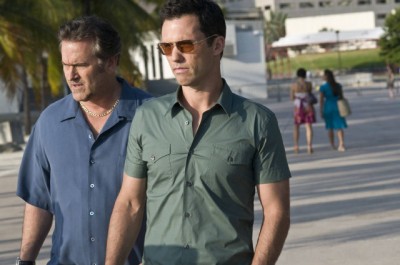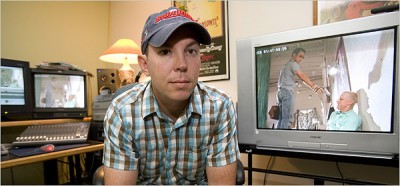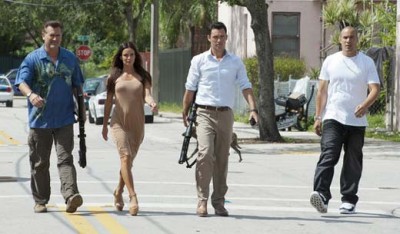The crew of USA Network’s Burn Notice – Bruce Campbell, Jeffrey Donovan, and show creator Matt Nix say farewell in a bittersweet “final” conference call with the Press. Last calls are always sort of bittersweet. I’ve been fully down with the Burn Notice crew since the beginning. They’ve always been great to work with, talk to and very generous with their time. We’ve had numerous conference calls with them over the years and visited the set – I still love Gabrielle’s gigantic sheep dog.
This week (Thursday 9/12) is the final episode of Burn Notice ever – and it doesn’t seem like it’s going to end well. It’s ironic that I asked one of the very first Burn Notice questions during their first conference call (before the show even aired) and now at the end, I get the last question. Yes, most of these are my questions – I’ll post the full 8 page unedited transcript at some point.
Is there anything that you guys wanted to do on the show that you couldn’t for whatever
reason in terms of character stunts or whatever?
Bruce Campbell: That’s a good question. Jeffrey what did you want to do?
Jeffrey Donovan: Well I’m a private pilot. And I fly a (Cirrus) which is an unbelievable plane. And I wanted to actually shoot a scene where you don’t cut so you know it’s me. And I actually fly, you know, me and Bruce or something like that or me and my mom to safety. And the camera is on us. And you see us actually be flying. I really wanted to do that. But we never got to do that.
Bruce Campbell: I agree. I think Jeffrey and my stunt double would have done just a great, great sequence.
Jeffrey Donovan: But – gee thanks Bruce.
Bruce Campbell: I roller skate like a mother scratcher. And I’ve pressured Matt, you know, what do these people do in their off season, you know, when they’re not working? I can never sell that. I tried it eight different ways, seven different seasons, never got in. So I’m going to make a YouTube video and I’ll be done with it.
Matt Nix: But you wanted to bowl as well. Are you actually a good bowler?
Bruce Campbell: Well bowling, yes, bowling, that was just one thing.
Jeffrey Donovan: He’s not a good bowler.
Matt Nix: Yes, okay
Jeffrey Donovan: You would need your stunt double for that Bruce.
Matt Nix: Yes, thank you.
Bruce Campbell: Yes, I’d say Jeffrey you also wanted to have an episode where you played a full 18 holes of golf on screen.
Jeffrey Donovan: Exactly.
Bruce Campbell: We were unable to do that. But yes.
Jeffrey Donovan: Sold my soul in four and a half hours. It was an 18-hole match.
Matt Nix: Yes, I mean actually I have – that’s a – for me that’s a hard question to answer just because, you know, I have a book of like the Burn Notice episodes that I was never able to do.
One thing actually though just being in Miami, there are certain things that just seemed totally logical to do. But that you – for various reasons are almost impossible to do. So like a boat chase, yes, and you need like six boats to actually do a boat chase so that you have boats on cameras and then this boat and that boat and three water safety crews.
Once you actually get into the logistics of doing a real boat chase that’s, you know, that like it seems like the most natural thing in the world to do on Burn Notice but it was something that we – you know we did pieces of boat chases and little stuff. But we never actually were able to do that kind of thing.
Also we always joked that we had a – on Burn Notice just because of our production schedule we were given special versions of the screenwriting software that would not allow us to write the word night because we can almost never shoot anything at night. So if you watch Burn Notice, like whenever it’s night they’re almost always inside because, you know, so that was…
Can a show like this or any show that features a hero, is it possible for the hero to have a happy ending?
Jeffrey Donovan: I would say that if you’re telling a story that has – if you’re telling a real story, I mean and you think about any classical story it’s like the ending will have both triumph and tragedy in it. You know what I mean? Like I think if you’re just telling a story that just has a sad ending, then well that’s a bummer. Like people don’t – that’s usually not why we go see – go turn on the TV or go to movies or whatever or read books.
At the same time if it is just happy then it really feels like the story doesn’t have any weight or consequence. And so I think that it’s always got to be a mixture of those two.
Burn Notice has had amazing number of great guest stars. Can you guys talk a little bit about who your favorites were and why?
Matt Nix: For me I’d say like my favorite – I have tons of favorites over the years. The people that I tend to think about the most in terms of guest cast were the big foils to Michael. Because those were always, you know, like for a one episode fill-in might be or guest actor of any kind might be interesting. But you’re not generally exploring a character over time, that kind of thing. We were lucky to get Garret Dillahunt to play Simon was a really fun one. Jay Karnes who played Brennen came back a number of times. Tim Matheson who played Larry.
You know the opportunity sort of to explore villainy like less as a dramatic conceit and really more in terms of character like who are these guys. What motivates them. Tricia Helfer who played Carla in the second season was magnificent. I’m leaving a bunch of people out. But those- actually JP who plays James in this season is also, you know, has done a great job.
So really exploring those motivations and going on that journey with an actor. And we’ve been blessed to have a lot of great ones. What about you guys?
Jeffrey Donovan: Yes, Jay Karnes…
Jeffrey Donovan: …only because it was the first time Matt had ever written a character that was smarter than Michael. And that was always the kind of precedent that no one in the room was ever smarter than Michael Westen. And Matt did a cool – wrote a character that was smarter than Michael. But his ego kind of got in his way which was his downfall.
I love Jay Karnes. But as far as craziest villains, Garret Dillahunt. His Simon, the tweets that I read about how – what a great thing to bring him back and then what a clever thing that Matt and the writers did about ending, you know, spoiler alert, his life. And showing kind of what Michael can be as a monster was just a great flag in the history of Burn Notice.
Bruce Campbell: The great Jack Coleman as well. You know playing the conflicted CIA guy. I just enjoyed Jack so much mostly as a person but his character was a lot of fun to watch because things were happening left and right around him and he was always, get Langley on the phone. He was always mad, you know. We’d show up on set and go hey are we going to hell at each other today? He’s like yes, I think we are. Like let’s do it.
John C. McGinley was very good. And you’re right, Tim Matheson was definitely one of the best. You know Larry was a great recurring, just really troublesome bad guy. And I think, you know, for actors bad guys are sometimes – those are the best parts to play because you can really chew it up. And Tim Matheson certainly did.
We just learned that a major character is going to die in the finale. I’m wondering what Jeffrey and Bruce would say to fans to prepare them for this information.
Bruce Campbell: Jeffrey. Don’t eat Chinese food before the episode.
Jeffrey Donovan: And my answer would be there’s nothing that can prepare them.
Okay. Well can I ask…?
Bruce Campbell: Yes. And I think – go ahead.
Why do you think that ending works for this series?
Bruce Campbell: You know one of the interesting journeys that Burn Notice has been on is it created a family for the audiences to watch. And I don’t – and though we’ve been humorous throughout the years there’s always been an underbelly of seriousness and tragedy.
I don’t think we could probably end the series with, you know, a bow tie and smiles on everyone’s faces. I think that the audience knows there has to be some sort of tragedy to show how important their journey was over the years.
Jeffrey Donovan: And I believe it’s called collateral damage. Once you have a group of people who have put their lives on the line every single week it’s hard to maintain that. The specifics of course would be better answered by Mr. Matt Nix.
Matt Nix: Yes. I mean I was not a – you know, I mean it’s a question for you guys. One of the central ideas and conflicts in this series has always been the – between Michael’s work and Michael’s family.
He started this series as a very isolated guy. Over the years he has, you know, acquired this family and these friends and these relationships that he didn’t have at the beginning.
We’ve always talked about the idea that there’s a reason that a spy who’s putting himself in, you know, these kinds of situations so consistently doesn’t have a bunch of close relationships.
It was important to me to say why have the last seven years mattered? Are those themes that we’ve addressed over the years, are they real? I think the answer to that has to be yes. And so, Michael’s always had to balance those two sides of his life and the final two episodes are really about choices and sacrifices.
It’s not just about killing off the character. It’s also about taking seriously the things that we’ve talked about and the issues that we’ve addressed over the last seven years.
How does the wrap up align with your original idea for ending this series? Is it pretty much on the same page or were there pages you used from your original plan in previous season finales?
Matt Nix: Both really. The kernel of the idea is what Michael has been going through this season and dealing with James Kendrick and his organization, that was in my mind from not the first year. I had a sense that we needed to land in a place that wasn’t just about Michael fighting another bad guy but was really about Michael, you know, wrestling with the demons and himself.
And tempted in a way to become this – the very thing that destroyed him in the beginning of the series. You know, like the people that burned him were in an organization operating outside of a established political structure and doing their own thing who felt that they were doing the right thing but, Michael was collateral damage. It’s an easy thing to become that if you’re not careful if you’re doing the sorts of things that Michael does. So that seed was always there.
At the same time over the course of seven years you discover new things and the – and I’d say that the emphasis on the team and the way the family came together in the show that was a much bigger element than I anticipated at the beginning of the show if that makes sense.



